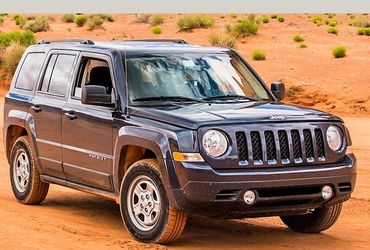
The car’s exhaust system contains a device called a catalytic converter. This device transforms dangerous pollutants found in exhaust gases into less dangerous ones. Jeep Patriot Catalytic Converter Problems are very common among users.
Before releasing them into the atmosphere. Mechanics would install a catalytic converter in the exhaust system of the Jeep Patriot. A small SUV that the manufacturer produced from 2007 to 2017. However, several customers reported that Jeep patriot catalytic converter problems.
By using a catalytic converter, a catalyst-assisted redox process. We can decrease internal combustion engine exhaust emissions by reducing the number of harmful gases and pollutants present in the exhaust. It is common for a catalytic converter to degrade over time and distance.
They will deteriorate more quickly if there is an issue with misfiring or a poor air/fuel mixture. If the catalytic converter clogs up, your Patriot’s performance may suffer. There are additional issues that it will face. You can read about Jeep patriot catalytic converter problems in this article.
What is a Catalytic Converter?
During the exhaust system of a vehicle, a catalytic converter converts the harmful exhaust gases produced by the engine into less harmful emissions.
It is similar to a muffler in appearance. In most cases, it is a stainless steel housing filled with platinum, palladium, and rhodium in the form of a ceramic honeycomb. By adding these elements to the exhaust system, harmful exhaust gases can be cleaned up that would otherwise be expelled.
How Does the Catalytic Converter Work?
There are several sections to the catalytic converter, commonly referred to as beds. There is a specific catalyst element in each of these catalysts that promotes a specific chemical reaction at a temperature of at least 400 degrees Fahrenheit. In this process, harmful CO, HC, and NOx exhaust gases are converted into less harmful CO2, H2O, and N gases that are released from the exhaust pipe of the vehicle.
Where is the Catalytic Converter Located on a Jeep?
The exhaust system of most Jeep vehicles, including the Wrangler and Cherokee models, is equipped with a catalytic converter. The exact location of your exhaust manifold can vary depending on the model year and engine size of your vehicle; however, it is typically located near the junction between your exhaust manifold and exhaust pipe. If you follow the pipe from your manifolds towards the rear of your vehicle, you may be able to locate it.
As it has a cylindrical shape with heat shielding surrounding it, it should be easy to identify. We recommend seeking the assistance of an experienced mechanic if you are unable to locate yours or do not feel comfortable performing this task yourself.
How Much is a Jeep Patriot Catalytic Converter Worth?
It is important to note that the cost of a Jeep Patriot catalytic converter varies greatly depending on the make, model, and year of the vehicle. Because of their vital role in reducing harmful exhaust emissions, these parts are generally quite expensive. The price of a new or aftermarket replacement part can range from $200 to $1,500 on average.
Purchasing an OEM (original equipment manufacturer) part will increase this cost range, as OEM parts are typically more expensive than aftermarket parts. As well as the size and type of converter, as well as any special features it contains, the price may also vary. In addition, labor costs should also be taken into account when estimating the overall cost of replacing this component.
What are the Jeep Patriot Catalytic Converter Problems?
The following are the most frequent signs of a blocked catalytic converter in a Jeep Patriot:
1. Insufficient speed
In a Jeep Patriot, slow acceleration or decreased engine performance most easily identifies a blocked catalytic converter. When you come to a halt, pressing the gas pedal may cause the car to accelerate correctly initially. However, once the engine reaches a certain speed, the rising exhaust gases will clog the system and cause it to perform poorly.
Even with the gas pedal fully depressed, there is no relief from the engine sputtering.
2. Low fuel efficiency
When a catalytic converter becomes clogged. It becomes more challenging for the engine to expel properly, causing an increase in fuel consumption.
3. Clogging
If dirt or carbon clogs the converter, it can diminish its capacity to convert pollutants.
4. Overheating
When the engine is running excessively hot, the converter may overheat, causing it to become damaged.
5. Mechanical damage
Impact or other mechanical damage can cause damage to the converter.
6. Age
over time, the converter may become less effective and require replacement.
7. Failed Oxygen Sensor
If the oxygen sensor fails, it can also cause the catalytic converter to fail. A proper diagnosis is to detect the issue.
8. Ceramic substrate
Another problem that can occur is damage to the converter’s ceramic substrate. Exposure to high temperatures can cause the ceramic; to crack or shatter, leading to this occurrence.
9. Using the wrong fuel or oil
If you suspect any issue with your car’s catalytic converter. You may be using the wrong fuel which isn’t for your patriot.
10. The emissions test was a failure
If the catalytic converter in a Patriot is defective. The exhaust gasses emitted by the engine may not be sufficiently filtered. Resolve the issue to pass an emissions test. Inspect the faulty catalytic converter. If the vehicle’s performance declines. Its fuel consumption increases or its emissions become more harmful.
What are the Symptoms of a Failing Catalytic Converter in a Jeep Patriot?
It is not uncommon for the catalytic converter to fail, as the years and mileage take their toll. They will fail faster if there is an issue with misfiring or a bad air/fuel mixture.
When your Patriot has a major engine problem, the check engine light will begin flashing. In most cases, this flashing condition occurs to help try and save the catalytic converter.
Most of the symptoms of a bad catalytic converter have to do with the lack of exhaust flow through the Cat. Once it gets so clogged, your Patriot will be barely drivable.
Here are the most common signs of a bad catalytic converter in a Jeep Patriot:
- When the exhaust flow decreases, your gas mileage will suffer.
- An onboard OBDII computer is present in almost every car built in the previous two decades. Using the provided “trouble code,” emissions-related issues can be identified and fixed.
- Because there won’t be enough airflow, your Patriot won’t start when the catalytic converter is that clogged.
- Smoke from the exhaust that is darker
- The stench of a bad egg
- An absence of throttle response at high speeds is a common sign of catalytic converter failure. If so, the catalytic converter in your Patriot has probably failed.
Acceleration problems in a Jeep Patriot
In a Jeep Patriot, there are several possible causes of acceleration issues, some of which include:
Engine mechanical issues: Poor acceleration may be the result of an engine issue, such as insufficient compression or a defective component.
Issues with the fuel system: Poor acceleration might be caused by a malfunctioning fuel pump, a clogged fuel filter, or an issue with the fuel injectors.
Transmission issues: Poor acceleration can be brought on by a transmission issue, such as a worn clutch or a failed torque converter.
Throttle body problems: The throttle body can become dirty and clogged, which can impede airflow into the engine and cause poor acceleration.
Mass airflow sensor: A failed or dirty mass airflow sensor can cause poor acceleration.
Spark plugs or ignition system: Either worn-out spark plugs or a malfunctioning ignition system can cause poor acceleration.
It is important to note that these are common causes of poor acceleration. But there may be other causes that are specific to your vehicle.
Shifting problems in a Jeep Patriot
There are several things that could go wrong with a Jeep Patriot’s shifting, some of which include:
Transmission fluid level: Shifting problems may result from a low transmission fluid level.
Transmission filter: A clogged filter can restrict the movement of transmission fluid and interfere with shifting.
Transmission control module (TCM): By failing to provide the transmission with the proper signals, a malfunctioning TCM might lead to shifting problems.
Solenoids: By preventing the transmission from shifting smoothly, a broken solenoid can interfere with shifting.
Clutch: A worn or damaged clutch can cause shifting issues.
Linkage or shifter: A linkage or shifter issue prevents the transmission from properly engaging, which can lead to shifting problems.
It is important to note that these are common causes of shifting problems. But there may be other causes that are specific to your vehicle. A proper diagnosis by a mechanic should be done to detect the exact issue.
How Often Do Catalytic Converters Need to be Replaced?
It is expected that the catalytic converter will last the lifetime of the vehicle if the engine is running properly. If the converter fails, it is typically caused by the entry of too much raw fuel, often as a result of an engine misfiring. The catalyst can become coated with too much unburned fuel, resulting in the converter becoming inoperable. Overheating and breaking apart of the converter can also result in a restricted or plugged converter.
In addition to the manufacturer’s factory warranty, the catalytic converter is covered under the emissions warranty of the vehicle. According to federal law, manufacturers are required to replace a defective converter for a period of fifteen years or one hundred thousand miles along with other emission control devices. Refer to your vehicle’s owner’s manual for information regarding warranty coverage, as it varies from state to state and from vehicle type to vehicle type.
Why Does My Jeep Patriot Catalytic Converter Need To Be Replaced?
Your Jeep Patriot will have a catalytic converter if it is equipped with an internal combustion engine (ICE).
Whenever your engine is running, the catalytic converter minimizes emissions of pollutants.
In the exhaust system, catalytic converters play an important role. Catalytic converters convert toxic gases created by engines into less toxic pollutants as a result of a chemical reaction that occurs inside them.
Due to environmental regulations, it is not legal to operate your Jeep Patriot without a catalytic converter. You may be fined for not complying with these regulations. In addition to reducing harmful pollutants entering the environment, they are also useful in reducing waste.
In the event that the Jeep Patriot’s catalytic converter is malfunctioning, you may notice a bad smell coming from the exhaust, or you may hear a rattling noise under the vehicle. Clogged catalytic converters can cause issues with drivability, performance and fuel consumption. They can also cause the car to not run at all.
You may need to replace your Jeep Patriot’s catalytic converter if you experience other operating issues. In such a case, AutoGuru may be of assistance.
What Happens During a Catalytic Converter Replacement?
Catalytic converters can be easily replaced. The operation will require a $20 piece of specialist equipment.
Make sure you purchase the correct item for the make, model, and year of your vehicle. Consider purchasing a new item rather than remaking an old one.
All four wheels should be raised while your vehicle is on jack stands. The air should be allowed to flow before you begin wrenching.
Catalytic converter replacement is a simple but time-consuming process. There is a need for specialist instruments for almost all of the stages, so novices should avoid performing these tasks on their own.
A power saw is used by the mechanic to remove the old catalytic converter. Due to the fact that it is welded to the car, it must be forced to be removed. While performing this operation, the mechanic will take precautions to ensure that your Jeep Patriot is not damaged.
Once the new converter has been installed, it must be welded in place. In spite of the fact that this is a relatively simple procedure, it is not an easy one. It is possible to charge more than the standard hourly rate for certain jobs because they require a degree of skill.
An inspection of the freshly installed exhaust system will be conducted by the mechanic. It is possible that your Jeep Patriot will need to be driven or run during the repair process. It will be checked by the mechanic that the converter has been installed and is functioning properly.
In order to reduce air pollution and climate change, your vehicle’s catalytic converter is vital. Fortunately, there is a quick and simple solution to the problem. You should be on the lookout for any unusual sounds or smells coming from your vehicle so that you may be able to detect any problems early on.
Tips to Save your Catalytic Converter
By performing regular maintenance on the car, the life of the catalytic converter can be increased. Injector leaks and misfires have the power to ruin a converter long before the Check Engine light comes on.
So, what can you do to prevent Jeep patriot catalytic converter problems? Here are a few tips for preventing converter failure brought on by heat, clogged substrate, and physical damage.
Maintain a healthy engine: Regular maintenance, such as oil changes and tune-ups. They can help keep your catalytic converter in good working order.
Drive responsibly: Avoid excessive idling and speeding. As these can put unnecessary stress on your catalytic converter.
Use the suggested fuel: Using the wrong fuel could harm your catalytic converter. Use only the power that the car’s manufacturer has approved.
Watch out for warning signs: Your catalytic converter may malfunction if you notice any warning lights or odd noises coming from your car.
Pay attention to the exhaust: A clogged catalytic converter can reduce power and fuel efficiency. Take the exhaust in for inspection if you notice any changes.
Careful: Be careful with the use of leaded gasoline, oil, and fuel additives that can cause damage to the catalytic converter. Avoid using fuel additives not recommended by the vehicle manufacturer. Use the correct grade of motor oil as recommended by the vehicle manufacturer. Avoid overloading your vehicle.
Keep in mind that, if you suspect your catalytic converter is damaged, it’s best to have it checked out by a professional mechanic.
Best Catalytic Converter for Jeep Patriot
It is important that you only use accessories and components from reputable manufacturers for your Jeep Patriot. The following are a few examples of Jeep Patriot catalytic converters
We offer three brands of Catalytic Converters that you can trust for your Jeep Patriot:
Walker Catalytic Converter– EPA Ultra, Direct Replacement, No Fabrication Needed from $613.99
MagnaFlow MagnaFlow HM Grade Federal / EPA Compliant Universal Catalytic Converter – 2.25in. – 99355HM from $214.99
Walker Catalytic Converter- EPA Ultra, Universal/ Fabrication Needed from $371.99
Conclusion
If a Jeep Patriot has over 100,000 miles on the odometer. Experiences significant decreases in performance, and high fuel consumption. There is a possibility that the catalytic converter has been damaged. Given the expensive nature of this component, various diagnostic tests are conducted to determine the root cause of the issue.
Keep Reading Why My Jeep Patriot Radio Not Working?
FAQ’s
What are the Jeep patriot starter problems?
Upon turning the key, the starter is in charge of starting the engine. Some common problems are;
Dead battery, Failed solenoid, Worn starter motor, Dirty or corroded connections, and Faulty ignition switch.
What are the Jeep patriot thermostat problems?
Some common problems that can occur with the thermostat in a Jeep Patriot include:
a stuck closed thermostat, the thermostat becoming stuck in the open position, and a faulty thermostat.
What is the Jeep patriot catalytic converter replacement cost?
A catalytic converter repair typically ranges from $945 to $2475, including both parts and labor. The cost of the converter itself can reach as high as $2250, which could potentially be equal to or even greater than the value of your vehicle.
Top 3 brands for Catalytic Converter products for the Jeep Patriot parts?
- Bosal
- Walker
- DEC
How often should I replace the catalytic converter on my Jeep Patriot?
The duration a catalytic converter lasts depends on factors like driving style and the quality of the converter. Usually, it should last between 50,000 and 100,000 miles. Inspect the converter’s condition as part of regular maintenance and replace it if it’s not functioning optimally.







Leave a Reply